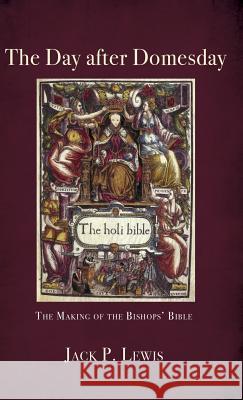The Day after Domesday » książka
The Day after Domesday
ISBN-13: 9781498233453 / Angielski / Twarda / 2016 / 170 str.
The Day after Domesday
ISBN-13: 9781498233453 / Angielski / Twarda / 2016 / 170 str.
(netto: 157,81 VAT: 5%)
Najniższa cena z 30 dni: 163,44
ok. 16-18 dni roboczych.
Darmowa dostawa!
Though more than four hundred years have elapsed since the Bishops' Bible was first published in 1568, its story has never been adequately told. No book-length evaluation has been published, and no adequate bibliography is available for guidance in studying this least known of the Tudor-period Bibles. This neglect is surprising in that Shakespeare's earlier plays reflect his use of the Bishops' Bible and that the Bishops' Bible was used by the translators of the King James Version as the basis for their revision. This study depicts the religious, literary, and intellectual atmosphere that produced the Bishops' Bible, describes its place in sixteenth-century translations, re-evaluates its contribution to the study of the English Bible, and investigates the history and qualifications of the men invited to participate in the translation project. Attention is given to the artwork, the most elaborate of any in first editions of early English Bibles, and to the notes designed to correct the objectionable Calvinistic notes of the Geneva Bible. A presumption that the bishops would not prepare a better Bible until ""a day after domesday"" gives the title to this study--The Day after Domesday. ""This important contribution to the study of the history of the English Bible is the only monograph dealing exclusively with the Bishops' Bible, the immediate predecessor and basis for the production of the King James Bible. Based on his meticulous research in contemporary resources and first-hand observation of the various printings, Dr. Lewis deals with all aspects of this Bible's story: rationale for the translation, translators, use in churches, art work, influence, and reception."" -- Don L. Meredith, Librarian, Harding School of Theology Lewis's book presents a magisterial and seminal study of the language, ecclesiastical significance, and literary influence of this little known Bishops' Bible. All who appreciate the impact and language of the King James Version will benefit from this now-authoritative investigation of the translation upon which the King James Version was based. This work by Dr. Jack Lewis is the singular most significant study of the Bishops' Bible to date."" --Richard E. Oster Jr., Professor of New Testament, Harding School of Theology Jack P. Lewis (1919-) received PhDs from Harvard University and Hebrew Union, was Senior Fellow at the W. F. Albright Institute of Archaeological Research, Jerusalem, Israel (1982-83), and is Professor Emeritus of Harding School of Theology, Memphis, Tennessee. Lewis served as translation consultant and editorial committee member for the New International Version. He has authored numerous articles and books, including The English Bible from KJV to NIV (1981).
Though more than four hundred years have elapsed since the Bishops Bible was first published in 1568, its story has never been adequately told. No book-length evaluation has been published, and no adequate bibliography is available for guidance in studying this least known of the Tudor-period Bibles. This neglect is surprising in that Shakespeares earlier plays reflect his use of the Bishops Bible and that the Bishops Bible was used by the translators of the King James Version as the basis for their revision.This study depicts the religious, literary, and intellectual atmosphere that produced the Bishops Bible, describes its place in sixteenth-century translations, re-evaluates its contribution to the study of the English Bible, and investigates the history and qualifications of the men invited to participate in the translation project. Attention is given to the artwork, the most elaborate of any in first editions of early English Bibles, and to the notes designed to correct the objectionable Calvinistic notes of the Geneva Bible.A presumption that the bishops would not prepare a better Bible until ""a day after domesday"" gives the title to this study--The Day after Domesday. ""This important contribution to the study of the history of the English Bible is the only monograph dealing exclusively with the Bishops Bible, the immediate predecessor and basis for the production of the King James Bible. Based on his meticulous research in contemporary resources and first-hand observation of the various printings, Dr. Lewis deals with all aspects of this Bibles story: rationale for the translation, translators, use in churches, art work, influence, and reception."" -- Don L. Meredith, Librarian, Harding School of TheologyLewiss book presents a magisterial and seminal study of the language, ecclesiastical significance, and literary influence of this little known Bishops Bible. All who appreciate the impact and language of the King James Version will benefit from this now-authoritative investigation of the translation upon which the King James Version was based. This work by Dr. Jack Lewis is the singular most significant study of the Bishops Bible to date.""--Richard E. Oster Jr., Professor of New Testament, Harding School of TheologyJack P. Lewis (1919-) received PhDs from Harvard University and Hebrew Union, was Senior Fellow at the W. F. Albright Institute of Archaeological Research, Jerusalem, Israel (1982-83), and is Professor Emeritus of Harding School of Theology, Memphis, Tennessee. Lewis served as translation consultant and editorial committee member for the New International Version. He has authored numerous articles and books, including The English Bible from KJV to NIV (1981).











